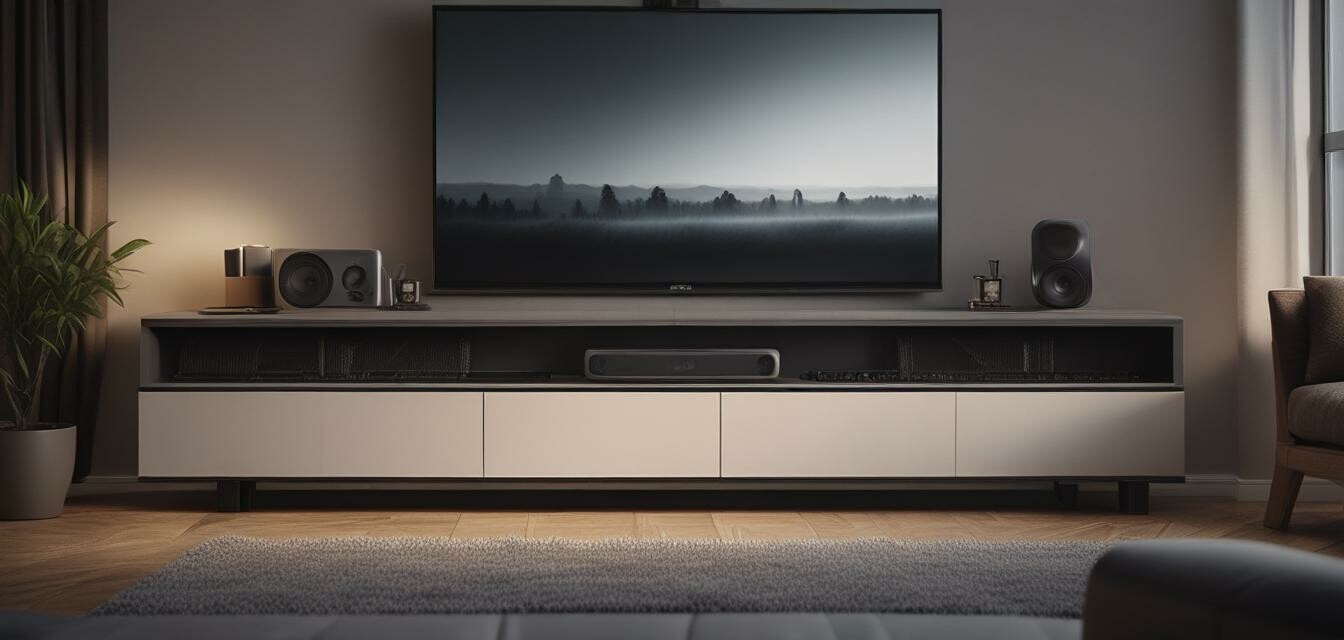
The Shift Towards Smart Soundbars
- Smart soundbars are integrating advanced technology to enhance audio experiences.
- Features such as voice control, connectivity options, and smart home integration are becoming standard.
- These advancements not only improve sound quality but also ease of use in various home environments.
- Consumers are increasingly looking for smart features in their audio equipment.
- It's essential for potential buyers to stay updated on the latest models and innovations.
The audio landscape is changing rapidly, with smart technology playing a pivotal role in enhancing the way we enjoy sound entertainment. Smart soundbars are not just devices for better audio; they are becoming the hub for controlling your home entertainment system, providing a seamless and integrated experience. This article delves into the evolution of smart soundbars, the technologies involved, and how they are shaping the overall user experience.
What are smart soundbars?
Smart soundbars are audio devices equipped with advanced technology that allows them to connect to the internet and other devices. They often come with added features that can significantly improve both sound quality and user convenience. Below are some common characteristics of smart soundbars:
- Voice Assistant Integration: Compatibility with services like Alexa, Google Assistant, and Siri.
- Multi-Room Audio: The ability to connect with other speakers in your home for synchronized sound.
- Streaming Services: Direct access to popular streaming platforms.
- Wi-Fi/Bluetooth Connectivity: Allows wireless connections to smartphones and tablets for easy control.
The Importance of Smart Features in Soundbars
The incorporation of smart features in soundbars is not just a trend; it reflects changing consumer preferences. Users are seeking devices that offer both high-quality sound and enhanced functionality. Here’s how smart features are impacting the user experience:
| Smart Feature | Impact on User Experience |
|---|---|
| Voice Control | Allows users to operate the soundbar hands-free, making it easier to switch between devices or adjust audio levels. |
| App Integration | Enables customized equalizer settings and control through smartphones, enhancing personalization. |
| Automatic Room Calibration | Optimizes sound output based on room acoustics, ensuring the best audio experience in any environment. |
| Regular Firmware Updates | Keeps the soundbar up to date with the latest features and security patches, extending the device's lifespan. |
Current Trends in Smart Soundbars
The market for smart soundbars is rapidly evolving, with several trends shaping the direction of technology.
- Integration with Smart Home Systems: Many smart soundbars are now designed to fit seamlessly into smart home ecosystems, enabling them to interact with devices like smart TVs, smart lights, and security systems.
- Improved Audio Formats: Technologies such as Dolby Atmos and DTS:X are frequently integrated into smart soundbars for an immersive audio experience.
- Compact Designs: As more consumers move to smaller living spaces, manufacturers are creating compact soundbars that still deliver high-quality audio.
- Enhanced User Interfaces: Focus is being placed on user-friendly interfaces both on the device and via associated apps.
Consumer Insights and Expectations
With the rapid adoption of smart technology in audio devices, it's crucial to understand consumer expectations.
Pros
- Streamlined setup and ease of use.
- Increased versatility with additional features.
- Ability to access a variety of streaming services directly.
- High-quality audio performance suitable for diverse settings.
Cons
- Can be more expensive than traditional soundbars.
- Over-reliance on smartphone apps for control may be inconvenient.
- Potential for software issues in early models.
How to Choose the Right Smart Soundbar
Choosing the perfect soundbar for your home can be overwhelming given the multitude of options available. Here are key factors to consider:
Beginner's Section: Tips for Buying a Smart Soundbar
- Assess your room size to determine the appropriate soundbar length and performance.
- Look for a model with multiple connectivity options (Bluetooth, Wi-Fi, HDMI).
- Check for compatibility with your existing smart home devices and ecosystems.
- Consider future-proofing by selecting soundbars that support the latest audio formats.
Final Thoughts
The market trend toward smart soundbars represents a significant shift in how we consume audio. With advancements in technology, consumers can expect devices that not only meet their audio needs but also integrate seamlessly with their smart homes. As users become more tech-savvy, the demand for high-quality sound that complements smart features will only continue to grow.
For those interested in exploring more about soundbars, check out our articles on budget soundbars and compact soundbars to find models that fit your needs.